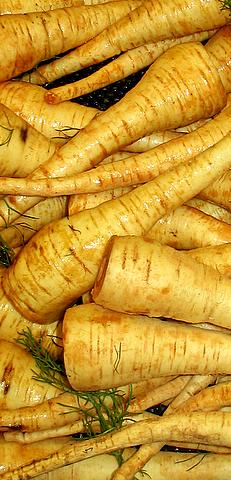parsnip
Hello, you have come here looking for the meaning of the word parsnip. In DICTIOUS you will not only get to know all the dictionary meanings for the word parsnip, but we will also tell you about its etymology, its characteristics and you will know how to say parsnip in singular and plural. Everything you need to know about the word parsnip you have here. The definition of the word parsnip will help you to be more precise and correct when speaking or writing your texts. Knowing the definition ofparsnip, as well as those of other words, enriches your vocabulary and provides you with more and better linguistic resources.

Parsnip roots
English

Etymology
From 16th-century parsnepe, from Middle English passenep, a modification of Old French pasnaie by influence of Middle English nepe (“turnip”), from Latin pastināca (“parsnip, carrot”), from pastinum (“two-pronged fork”) as in pastināre (“to dig up the ground”).
Pronunciation
- (General American) IPA(key): /ˈpɑɹ.snɪp/
- (Received Pronunciation) IPA(key): /ˈpɑː.snɪp/
Audio (Southern England): (file) - Hyphenation: par‧snip
Noun
parsnip (plural parsnips)
- A biennial plant, Pastinaca sativa, related to the carrot.
- The root of the parsnip, when used as a vegetable.
Derived terms
- cow parsnip (Heracleum spp.)
- cultivated parsnip (Pastinaca sativa vars.)
- fine words butter no parsnips
- giant cow parsnip (Heracleum mantegazzianum)
- giant parsnip (Heracleum spp.)
- golden meadow parsnip (Zizia aurea)
- meadow parsnip
- parsnip chervil (Chaerophyllum bulbosum)
- parsnip moth
- parsnip swallowtail
- parsnip webworm
- pig's parsnip
- poison parsnip (Pastinaca sativa)
- rough parsnip (Opopanax chironium))
- sea parsnip (Echinophora spp.)
- Victorian parsnip (Trachymene incisa, etc.)
- water parsnip (Sium spp.)
- wild parsnip (Pastinaca sativa)
Descendants
Translations
the plant Pastinaca sativa
|
the edible root of Pastinaca sativa
|